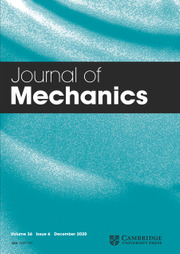Article contents
Bivariate Pseudo-Spectral Local Linearisation Method for Mixed Convective Flow Over the Vertical Frustum of a Cone in a Nanofluid with Soret and Viscous Dissipation Effects
Published online by Cambridge University Press: 18 August 2017
Abstract
In this investigation, we intend to present the influence of the prominent viscous dissipation and Soret effects on mixed convection heat and mass transfer over the vertical frustum of a cone in a nanofluid. The model used for the nanofluid incorporates the effects of Brownian motion and thermophoresis. In addition, the uniform wall nanoparticle condition at the surface is replaced with the zero nanoparticle mass flux condition to execute physically applicable results. The governing equations of a nanofluid flow in the dimensional form are reduced to a system of partial differential equations in the non-dimensional form by using suitable non-similarity variables and then solved by using a recently introduced spectral method named as Bivariate Pseudo-Spectral Local Linearisation Method (BPSLLM). The convergence and error analysis tests are conducted to examine the accuracy of the spectral method. To validate the method, the present numerical results are compared with the existing results in some special cases and the outcomes are observed to be in very good agreement. The effects of Brownian motion, thermophoresis, Eckert number, Soret number, nanoparticle and regular buoyancy parameters on the dimensionless surface drag, heat, nanoparticle mass and regular mass transfer rates over the vertical frustum of a cone are discussed and illustrated graphically.
Keywords
Information
- Type
- Research Article
- Information
- Copyright
- Copyright © The Society of Theoretical and Applied Mechanics 2017
References
- 3
- Cited by

